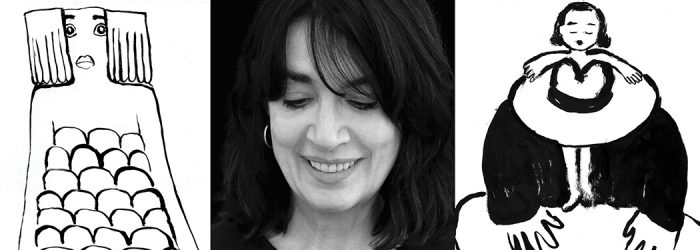
November 1, 2017 – Montreal – National Film Board of Canada (NFB)
The National Film Board of Canada congratulates animator and frequent NFB creative collaborator Michèle Cournoyer on winning the 2017 Prix Albert-Tessier—making her the first female animation filmmaker to receive this honour. The award is being presented to Cournoyer today, during a formal ceremony at the Parliament Building in Quebec City. Quebec’s highest honour in cinema, the award recognizes her body of work and her significant contribution to filmmaking in the province. The Prix Albert-Tessier is one of 14 Prix du Québec awarded every year.
“The NFB is delighted to see this prestigious prize awarded to a female animation filmmaker, a first in the history of the award. The award underlines the important role of animation in Quebec cinema and the contribution of  Michèle Cournoyer as an artist whose ability to powerfully and eloquently express a woman’s point of view on personal subjects has served as a model for young women directors. This year, the Cinéaste recherché(e) competition, through which Michèle began her animation career at the NFB, is open to women only, in order to increase their numbers in the world of animation,” said Claude Joli-Coeur, Government Film Commissioner and NFB Chairperson.
Michèle Cournoyer as an artist whose ability to powerfully and eloquently express a woman’s point of view on personal subjects has served as a model for young women directors. This year, the Cinéaste recherché(e) competition, through which Michèle began her animation career at the NFB, is open to women only, in order to increase their numbers in the world of animation,” said Claude Joli-Coeur, Government Film Commissioner and NFB Chairperson.
Michèle Cournoyer is a leading figure in animation in Quebec and Canada. Her powerful body of work, created primarily in black and white, frequently explores the theme of metamorphosis and skillfully tackles difficult topics with an extraordinary sense of humour and tragedy. Cournoyer was born in Saint-Joseph-de-Sorel, Quebec, in 1943 and studied piano, graphic arts, photography and film animation. In the 1970s, she made several independent shorts, including experimental collage films. As a set designer, art director, costume designer and screenwriter, she also collaborated on a number of Quebec films, including Gilles Carle’s La mort d’un bûcheron (1973) and Mireille Dansereau’s L’arrache-cœur (1979).
In 1989, Cournoyer won the ninth Cinéaste recherché(e) competition, organized by the NFB French Program’s Animation Studio. The five films she subsequently made there garnered some 30 international awards. The first, A Feather Tale (1992), depicts a cruel game in which love is stripped of its golden glow. Using the rotoscoping technique, she followed up with An Artist (1994), which tells the story of a young girl who is totally devoted to music. The Hat (1999), an unflinching look at incest, was screened at the Cannes Film Festival Critics’ Week. The film marks her departure from rotoscoping and split-screen shots in favour of ink-on-paper gesture drawings. Accordion (2004), presented in competition at the Cannes Festival, deals with romantic relationships in the era of technological mediation. With Robes of War (2008), Cournoyer again explores a timely topic—female suicide bombers—from a decidedly feminine standpoint. Cournoyer left the NFB in 2009, but her next film, Soif (2014), which deals with alcoholism, was produced by Unité centrale and co-produced by the NFB. These six films, produced or co-produced at the NFB, are streaming free of charge at NFB.ca.
Cournoyer’s films have garnered awards at major film festivals around the world: Annecy, Banff, Chicago, Dresden, Hiroshima, Montreal, Ottawa, Toronto, Vienna and Zagreb. The Hat and Robes of War both won the Jutra Award for best animated short. She also received a 2017 Governor General’s Award in Visual and Media Arts.
Click here to watch an interview segment with Cournoyer, directed by Denys Desjardins, as part of Making Movie History: A Portrait in 61 Parts.
–30–
Associated Links
2017 Prix Albert-Tessier
Unité centrale